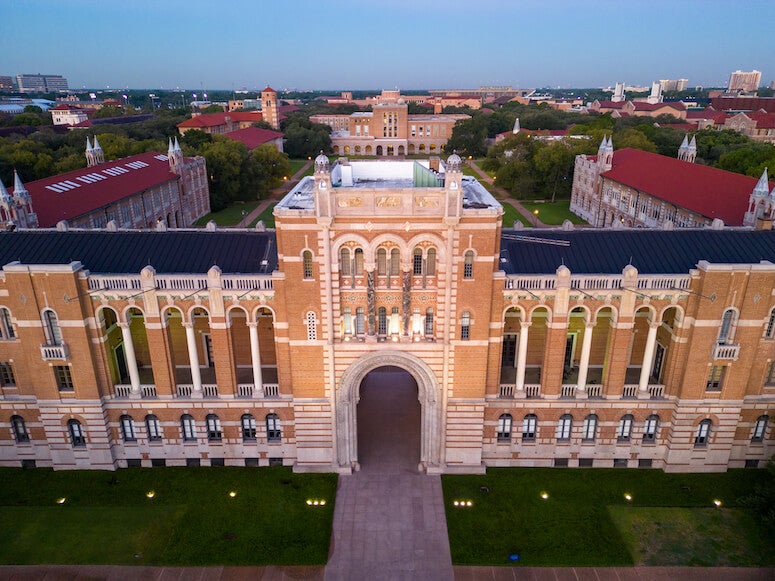Rising Rice seniors Maria Hancu, Alex Lin, Ryan Wang and Ruofeng “Charlie” Liu are the latest Owls to win the coveted Goldwater Scholarship, one of the most prestigious honors bestowed each year upon pioneering STEM undergraduates across the country planning to pursue doctoral degrees.
Hancu (a biosciences and chemistry double-major with a minor in art history), Lin (a chemistry major with a minor in biochemistry and cell biology), Wang (a neuroscience, cognitive science and computer science triple-major) and Liu (an operations research major) may have all walked different paths on the way to their Goldwater wins, but running through all of their research interests is the common thread of solving tricky problems with an aim toward helping others.
The fact that so many Rice students were awarded Goldwater Scholarships this year is also cause for excitement. According to Jessica Khalaf, the Center for Civic Leadership’s director of operations and programs who assisted this year’s students navigating their Goldwater applications, Rice hasn’t had four students win the scholarship in the same year since 2013.
“The Goldwater application process is a rewarding opportunity for any of our STEM students to synthesize their research experiences while looking forward into their professional and academic trajectories,” Khalaf said. “Having four students receive the honor is a testament to the possibilities available at Rice for our undergraduates to immerse themselves in research. We here at The Center for Civic Leadership support all students considering fellowships and guide them from ideation to submission of an application.”
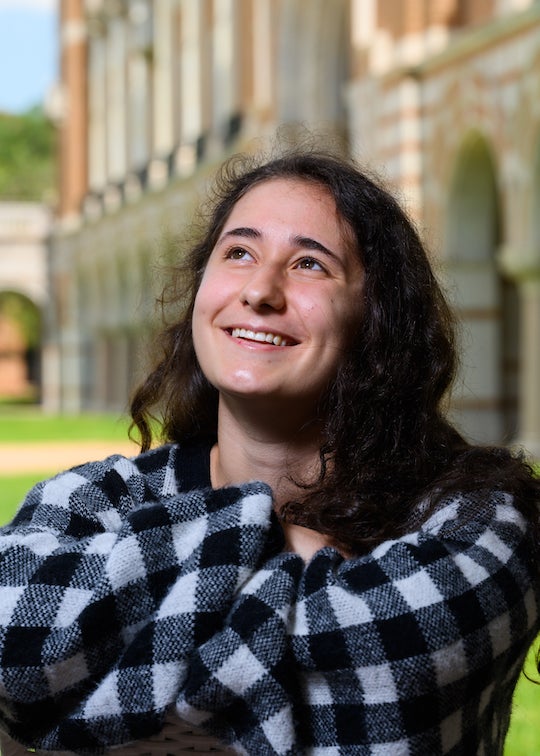
After arriving at Rice as an aspiring biosciences student with medical school in mind, Hancu quickly fell in love with organic chemistry during her freshman year. Looking for a way to conduct research at the intersection of biology and chemistry led her to the Bioscience Research Collaborative laboratory of Jeffrey Hartgerink, professor of chemistry and bioengineering and vice chair of the chemistry department.
Much of the research she’s conducted as part of the Hartgerink Research Group has focused on microscopic collagen proteins, which has uncovered novel collagen bundling structures that could potentially lead to new developments in targeted medicine delivery mechanisms.
“I saw that Dr. Hartgerink’s research is very much on the interface of biology and chemistry, and this project is the same,” Hancu said. “There’s very much an interplay between the chemical structure of collagen, and also the biological context in which they work, so it definitely scratched that itch that I’d found out that I had my freshman year.”
Hancu now plans to pursue a dual M.D. and Ph.D. to best position herself to pursue all of her scientific passions.
“I started having to think about, ‘How can I put these two together, the medicine part and the chemistry and biology research part?’ And the M.D./Ph.D. is the best way to go about that,” Hancu said.
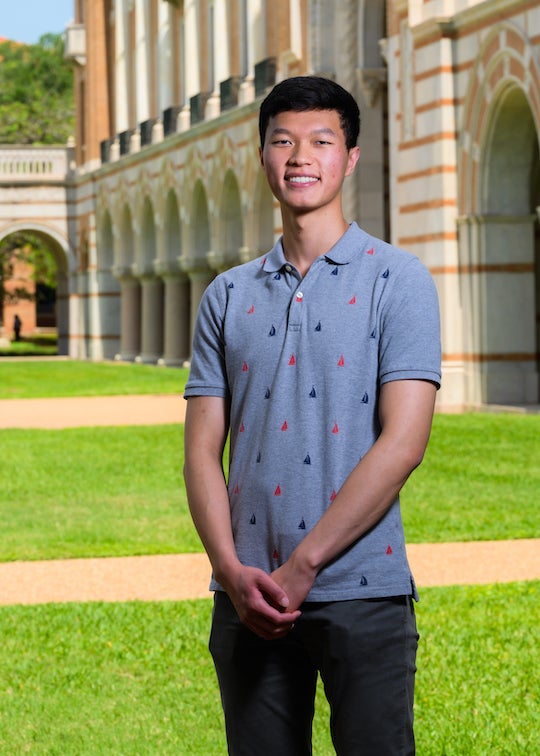
Her fellow Owl, Lin, is also fascinated by the intermingling of organic chemistry and biology; after earning his doctorate, he has his eyes set on ultimately either entering the pharmaceutical industry or becoming a chemistry professor with a research lab of his own.
Most of Lin’s research at Rice has taken place in the lab of chemistry professor Zachary Ball, where he’s worked on projects related to modifying the amino acids in peptides. More recently, Lin has conducted research inspired in part by his recent summer internship at MD Anderson Cancer Center, focused on novel ways of making sulfoximines, a type of sulfur-based organic compound that he hopes could help develop specialized treatments for numerous diseases and forms of cancer.
“As a chemistry major, and certainly as an organic chemistry major, I get to see the scientific side of chemistry and biology together,” Lin said. “And certainly working with Dr. Ball’s lab, it’s very much a mixture of both sides.”
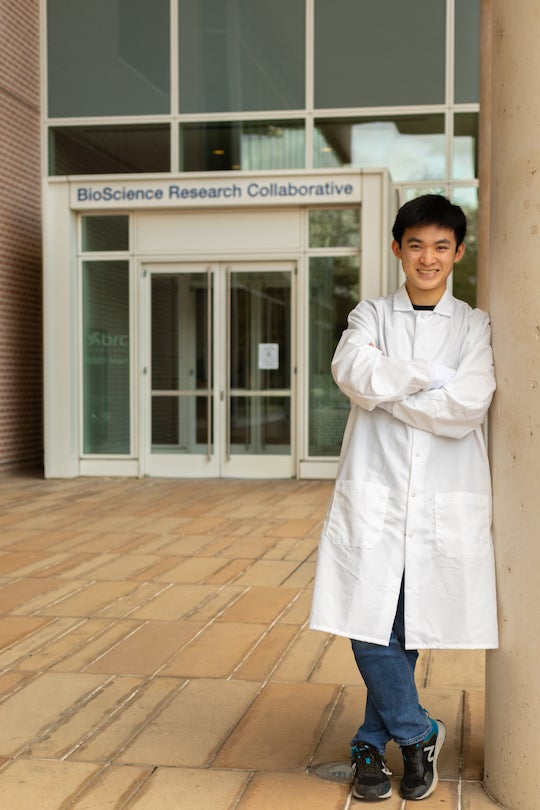
Wang’s research is also focused on discovering novel ways to innovate healthcare processes, from the bioengineering side of STEM. As a member of assistant professor of bioengineering Jerzy Szablowski’s Laboratory for Noninvasive Neuroengineering, Wang has worked with his colleagues to devise novel techniques for studying and treating the brain.
One of the lab’s primary research goals is to develop methods to more safely treat and diagnose complex neurological disorders like Parkinson’s disease. Wang’s research has focused on acoustically targeted chemogenetics, a process by which neurons in the brain can be precisely stimulated without the need for surgical intervention. After Rice, Wang plans to pursue a Ph.D. program that would allow him to continue his neuroengineering work.
“One of the things I value most is the positive impact that I can have on society and the people around me. I think that’s been a major driving factor in my research pursuits,” Wang said.
Liu’s Goldwater Scholarship was awarded thanks in large part to the work he conducted in the lab of Andrew Schaefer, Rice’s Noah Harding Chair and Professor of Computational Applied Mathematics and Operations Research. During his time at Rice, Liu has also worked closely with Jesse Chan, assistant professor of computational applied mathematics and operations research.
One of Liu’s current projects gets to the heart of what operations research is all about: “using mathematical tools to find the optimal decision to make under complex circumstances,” he explained. The project in question — much like those of his fellow 2023 Goldwater winners — could end up saving lives in the future, as it concerns redesigning existing geographical medical district models to more efficiently get organ donations to patients in need of liver transplants.
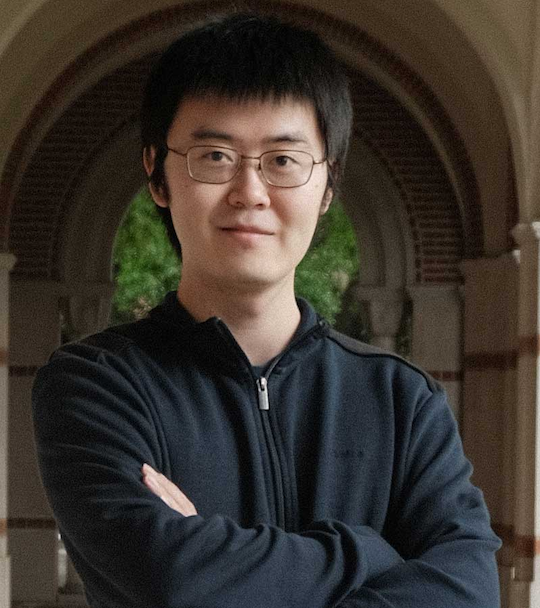
“The U.S. has great geographical disparities in terms of liver supply and demand, where there are some regions that have huge demand and really little supply, which causes huge geographical inequity,” Liu said. “So we’re trying to redesign these districts using combinatorial optimization techniques to minimize the inequity caused by the current policy.” Liu is looking to pursue a doctoral degree in a program where he can delve into “the niche where operations research and theoretical computer science intersect.”
Besides their desire to pursue research endeavors whose fruits will have a tangible positive impact on the lives of others, Rice’s four latest Goldwater-winners also share the humility to acknowledge that while their hard work paved the way to their latest honor, they couldn’t have made it without the steadfast support of their mentors, friends and family.
“I couldn’t have done this without them — research takes a village, and winning something like this is just as much a reflection of other people’s work and support as it is mine,” Hancu said.
Wang concurred: “I’m grateful for all the mentorship and support, both from my peers and from my lab,” he said. “I definitely couldn’t have done it without them, and I’m extremely grateful for the opportunities, advice and mentorship I’ve been able to have here. Hopefully, I can give back in a similar way to my peers here at Rice.”
And their message to those students dreaming of one day winning a Goldwater Scholarship themselves?
“I was in a similar boat — I wasn’t sure whether I wanted to apply,” Wang said. “And then I met with the Center for Civic Leadership, which I think was the first step in solidifying that process. So I highly recommend meeting with them, even to just discuss the scholarship and what it’s about.”
“Give it a shot! You have nothing to lose,” Liu said.

